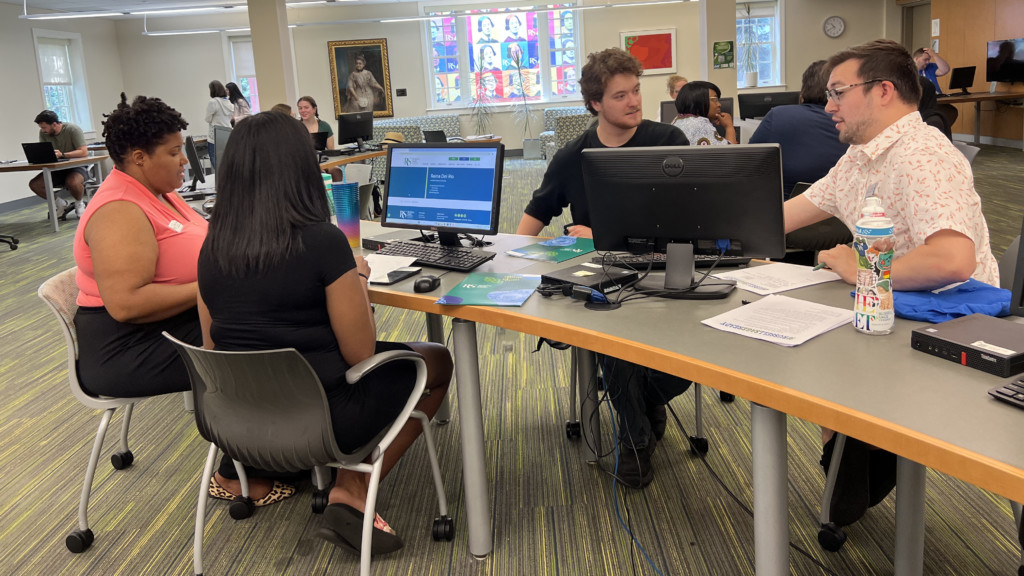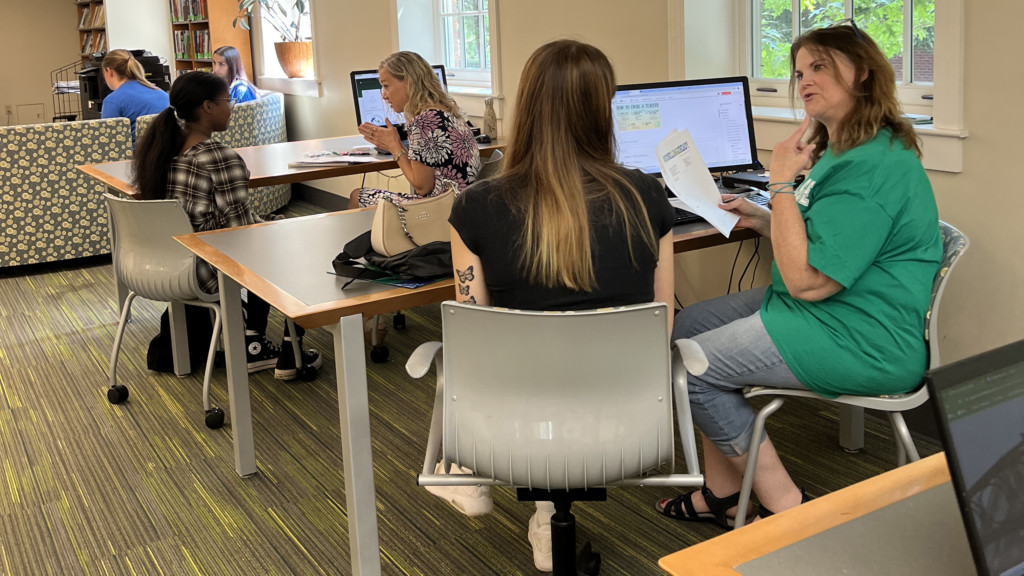A popular way to get a jump start on a bachelor’s degree is to earn college credits in high school.
This blog post will be useful to you whether you are just starting high school and thinking ahead, or if you are making your final college decision and looking for the specific steps to follow to apply the college credits you earned in high school:
- Read about the benefits of earning college credit in high school, such as saving money, saving time, and making it possible to add a second major or additional minor;
- Explore how you can earn college credit in high school and what credit Russell Sage accepts, like Dual Enrollment, Advanced Placement (AP), International Baccalaureate (IB), and College Level Examination Program (CLEP) credits;
- Find step-by-step instructions for transferring the college credits you earned in high school to Russell Sage College.
(If you are interested in transferring to Russell Sage from another college, find more information and download a transfer checklist at sage.edu/transfer.)
Why Earn College Credits in High School?
There are several good reasons to earn college credits in high school, from saving time and money on your bachelor’s degree, to getting a head start on your graduate degree, to adding to your resume with a double major or extra minor.
Save Time and Money in College
Depending on the number of college credits that you earn in high school, you could finish your bachelor’s degree a semester early, or even a year early — leading to significant tuition savings.
On top of the savings, students who finish their bachelor’s degree in less than four years enter the workforce earlier, which often means higher earnings over the course of their career.
Get a Head Start on Grad School
Students who earn college credits in high school may find they have room in their schedule to take graduate courses in their junior or senior year of college if the college allows for this. This can potentially save you money and time on a graduate degree.
Other Advantages of Earning College Credits in High School
Students who earn college credits in high school may have the option to pursue a second major or a minor. This extra expertise can help your resume stand out!
Sometimes, earning college credits in high school makes it possible to take a lighter course load in college, although it is very important to check in with the financial aid office and your advisors first (Many undergraduate financial aid packages are contingent on enrolling for a certain number of credits.)

What Types of College Credits from High School Does Russell Sage Accept?
Here at Russell Sage College, we accept Advanced Placement, International Baccalaureate, and Dual Enrollment credits. Let’s explore how you can earn these different types of college credit while you are in high school, and how to apply AP, IB, and dual enrollment credits to your Russell Sage College degree.
Dual Enrollment Credit
Many high schools offer classes that allow students to earn college credit through an affiliation with a community college, state college, or private college. This type of credit is known as Dual Enrollment Credit or Standard College Credit. Russell Sage accepts Dual Enrollment Credit or Standard College Credit when you achieve a C grade or higher in a course.
Credit for Advanced Placement and International Baccalaureate Scores
Many high school students earn college credit in high school by taking Advanced Placement or International Baccalaureate classes and achieving high scores on AP or IB exams. The AP or IB scores required for Russell Sage College credit vary by subject.
CLEP Exam Credit
The College Level Examination Program is a way to earn college credit outside of traditional coursework, by demonstrating mastery of a subject on a CLEP exam. Find information about the CLEP exams and scores accepted for credit at RSC in the college catalog.
How to Transfer College Credits Earned in High School
Russell Sage makes it simple to transfer college credits earned in high school. Usually, you’ll provide the documentation of the college credit you earned in high school early in the summer before you start college.
Keep reading for a step-by-step guide, and remember that RSC’s admission team is available for any questions you have. Reach an admission counselor at [email protected] or 518-292-1730.
Step 1: Apply
When you apply to Russell Sage College, both the Russell Sage-specific application and the Common App also ask if you have college credit earned in high school. Simply answer “yes” to start the process.
Step 2: Submit Your Official Transcripts or Exam Scores
If you decide to attend Russell Sage College — and we hope you do — an admission counselor will reach out to you early in the summer before your first year, to remind you to submit documentation of the college credit you earned in high school.
If you need Russell Sage’s Designated Institution Code, it is 2764.
Dual Enrollment Credit Transfer
- To have your Dual Enrollment or Standard College Credits documentation sent to Russell Sage, request a transcript from the college that granted the credit (You can often do this by Googling “transcript” and the name of the college.)
- Important: RSC needs to receive the final transcript directly from the college, even if your grade is noted on your high school transcript.
- Final transcripts can be sent to [email protected] or mailed to the Office of Admission at 65 1st Street, Troy, NY 12180.
- You can also use the National Student Clearinghouse or Parchment academic credentials manager to provide your transcripts.
H4: AP, IB, and CLEP Credit Transfer
- To have your AP scores sent to Russell Sage, visit apscore.collegeboard.org/scores.
- To have your IB results sent to Russell Sage, visit ibo.org/programmes/diploma-programme/assessment-and-exams/requesting-transcripts.
- To have your CLEP scores sent to Russell Sage, visit clep.collegeboard.org/earn-college-credit/your-score.
Step 3: Work With Your Academic Advisor to Plan Your Courses
You’ll be invited to Russell Sage’s Ready Day the summer before your first year, and one of the things you will do at Ready Day is meet with an advisor, who will help you select your first semester classes. Your advisor will review the college credit you earned in high school, their course equivalents at Russell Sage, and what classes you might like to take instead.

FAQs About Using College Credit Earned in High School
In addition to questions about the benefits of earning college credit in high school and how to transfer those credits, Russell Sage’s admission counselors and tour guides are frequently asked if there is a limit to how many credits they can bring from high school, and what bachelor’s degree courses their high school credits will count toward. We’ve answered those questions below.
Is There a Limit to the College Credits I Can Transfer from High School?
Russell Sage College will work with you to bring in the college credits you earned in high school.
Some first-time, first-year college students begin Russell Sage with 15, 20, or even 30 college credits that they earned in high school. That said, what credits transfer and what they count toward will depend on your major; some majors require you to take specific classes at Russell Sage.
Can I Use the College Credits I Earned in High School for Any Major?
The short answer is yes — although, as mentioned above, some majors do require you to take certain courses at Russell Sage.
The college credit you earn in high school will most often be applied to general education requirements or, in some cases, 101-level courses within your major.
You’ll meet with an advisor the summer before you start Russell Sage — and regularly throughout your four years in college — who will review what credit you have, and what credit you need to earn your bachelor’s degree. They’ll explain your options and help you stay on track with your degree plan.
Make the Most of the College Credit You Earned in High School at Russell Sage College
Reach out to an undergraduate admission counselor to learn more about Russell Sage College’s degree programs and Gator Gateway Undergraduate Success Program.

